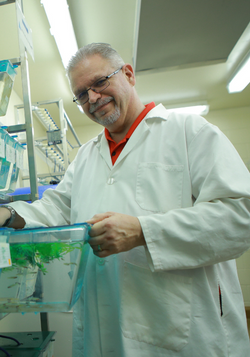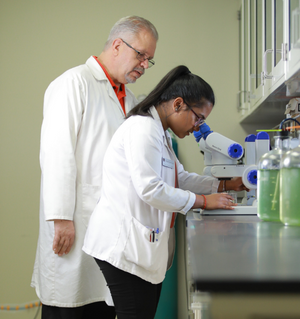EXPLORE
Frederick Williams, Ph.D.
 Professor and Chair
Professor and Chair
Department of Pharmacology and Experimental Therapeutics
University of Toledo College of Pharmacy and Pharmaceutical Sciences
Email: frederick.williams2@utoledo.edu
Educational Background
| Ph.D. Medicinal Science/Biochemistry | Medical College of Ohio, 1990 |
| M.HS. Microbiology/Immunology | Grand Valley State, 1985 |
| B.S. Biology | University of Michigan, 1982 |
Research

Our research is two-fold.
1. We study developmental and behavioral toxicities of drugs and environmental chemicals.
2. We create animal models of human diseases and disorders using the zebrafish.
One initiative involves tracing the behavior of an animal exposed to methamphetamine or cathinones (bath salts) and tying that behavior to both the concentration of the illicit drug in the brain and the potential targets for the drug. A procedure called Photo Affinity Labelling gives an understanding of what proteins a drug probe interacts with. Concentrations of drug can be found in whole brain mixtures using a piece of equipment called an LCMS which can find really small amounts of drug in samples. Behavioral screens are done in adult fish exposed to various concentrations of drug, the Novel Tank Test, and real time tracking software which allows behavior tracking of the animal once exposed to the drug.
Another initiative involves looking for chemicals that would alleviate repetitive behaviors. This is a typical problem found in Autism Spectrum Disorders. Through research, Dr. Williams and his colleagues have found a mutant fish that has a similar mutation seen in autism and also has repetitive behaviors that can be screened for. The plan for this initiative is to find compounds that would slow down the repetition or stop it and then see if that compound would work in other animal models of autism before trying to get that drug to clinical trials. Compounds currently being screened are involved with targeting the Muscarinic acetylcholine receptors in the brain.


